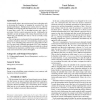Free Online Productivity Tools
i2Speak
i2Symbol
i2OCR
iTex2Img
iWeb2Print
iWeb2Shot
i2Type
iPdf2Split
iPdf2Merge
i2Bopomofo
i2Arabic
i2Style
i2Image
i2PDF
iLatex2Rtf
Sci2ools
EUROSYS
2006
ACM
2006
ACM
Balancing power consumption in multiprocessor systems
Actions usually taken to prevent processors from overheating, such as decreasing the frequency or stopping the execution flow, also degrade performance. Multiprocessor systems, however, offer the possibility of moving the task that caused a CPU to overheat away to some other, cooler CPU, so throttling becomes only a last resort taken if all of a system’s processors are hot. Additionally, the scheduler can take advantage of the energy characteristics of individual tasks, and distribute hot tasks as well as cool tasks evenly among all CPUs. This work presents a mechanism for determining the energy characteristics of tasks by means of event monitoring counters, and an energy–aware scheduling policy that strives to assign tasks to CPUs in a way that avoids overheating individual CPUs. Our evaluations show that the benefit of avoiding throttling outweighs the overhead of additional task migrations, and that energy–aware scheduling in many cases increases the system’s throughput. ...
Related Content
| Added | 10 Mar 2010 |
| Updated | 10 Mar 2010 |
| Type | Conference |
| Year | 2006 |
| Where | EUROSYS |
| Authors | Andreas Merkel, Frank Bellosa |
Comments (0)

